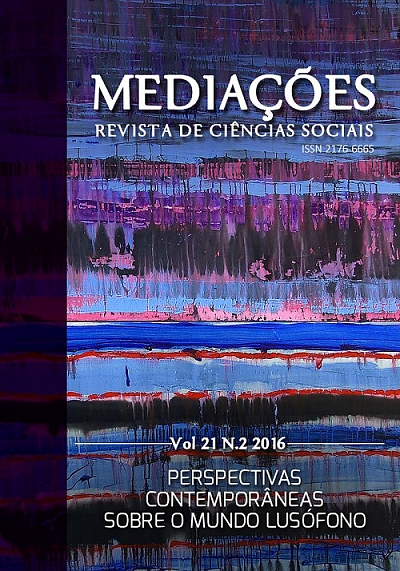Dancin' within Lusophony: capoeira'sinstitutionalization in Portugal
DOI:
https://doi.org/10.5433/2176-6665.2016v21n2p144Keywords:
Capoeira, Sports, Culture, InstitutionalizationAbstract
Capoeira is a cultural and sports activity of african-Brazilian origin that arrived in Portugal in the late eighties with the Brazilian emigration and which is practiced today throughout the country. This article aims to analyze the impact of the capoeira institutionalization process in Portugal, initiated by the Portuguese state in 2010 together with the Luso-Brazilian community of practitioners. It intends to: (a) verify the contradictions of the process regarding the understanding of the various actors about what capoeira is and how it should be conceived, as well as (b) identify power relations between the state and representative sports institutions of capoeiristas. In order to accomplish this task, we interviewed the different actors involved and analyzed specific documentation on the subject.Downloads
References
BURLAMAQUI, Aníbal. Ginástica nacional (capoeiragem), metodizada e regrada. Rio de Janeiro, 1928.
ELIAS, Norbert. O processo civilizador: uma história dos costumes. Rio de Janeiro: J. Zahar, 1992.
FALCÃO, José Luis Cirqueira. A escolarização da capoeira. Brasília: Editora Royal Court, 1996.
FALCÃO, José Luis Cirqueira. O jogo da capoeira em jogo e a construção da práxis capoeirana. 2004. Tese (Doutorado em Educação) - Universidade Federal da Bahia, Salvador, 2004.
FEDERAÇÃO PORTUGUESA DE CAPOEIRA. Disponível em: http://www. fpcapoeira.org/. Acesso em: 24 fev. 2015.
FONSECA, Vivian. A capoeira e o mundo do trabalho: embates acerca da profissionalização. Cadernos AEL, Campinas, n. 28, 2010. Disponível em: http://www.ifch.unicamp.br/ojs/index.php/ael/article/view/2586/1996. Acesso em: 1 abr. 2015.
GILROY, Paul. O atlântico negro: modernidade e dupla consciência. São Paulo: Editora 34, 2001.
NASCIMENTO, Ricardo César Carvalho. Mandinga for export: a globalização da capoeira na Europa. 2015. Tese (Doutorado em Antropologia) - Universidade Nova de Lisboa, Lisboa, 2015.
PORTAL CAPOEIRA. Disponível em: http://portalcapoeira.com/. Acesso em: 24 fev. 2015.
POURDEUS JUNIOR, Ismael. Portugal em transe: transnacionalização das religiões afro-brasileiras: conversão e performance. Lisboa: Imprensa das Ciências Sociais, 2009.
SARAIVA, Clara. Afro-brazilian religions in Portugal: bruxos, priests and pais de santo. Disponível em: https://etnografica.revues.org/292. Acesso em: 8 fev. 2011.
SOARES, Carlos Eugénio Líbano. A negrada instituição: os capoeiras no Rio de Janeiro. Rio de Janeiro: Prefeitura Municipal do Rio de Janeiro, 1994. (Coleção Biblioteca Carioca).
Downloads
Published
How to Cite
Issue
Section
License
Copyright (c) 2016 Ricardo Carvalho

This work is licensed under a Creative Commons Attribution 4.0 International License.
Copyright on articles published in Mediações belongs to the author(s): in the case of partial or entire republication of the original publication, we ask author(s) to indicate the original publication in the periodical.
Mediações uses the Creative Commons Attribution 4.0 International license, which allows Open Access, enabling any user to read, download, copy and disseminate its content so long as adequately referenced.
The opinions expressed by the author(s) are their sole responsibility.

































